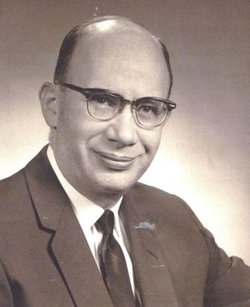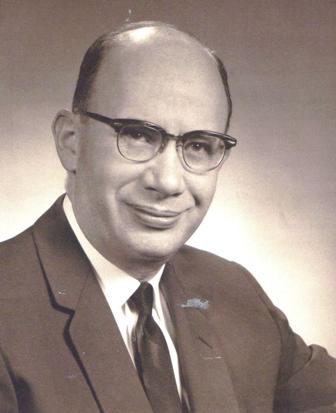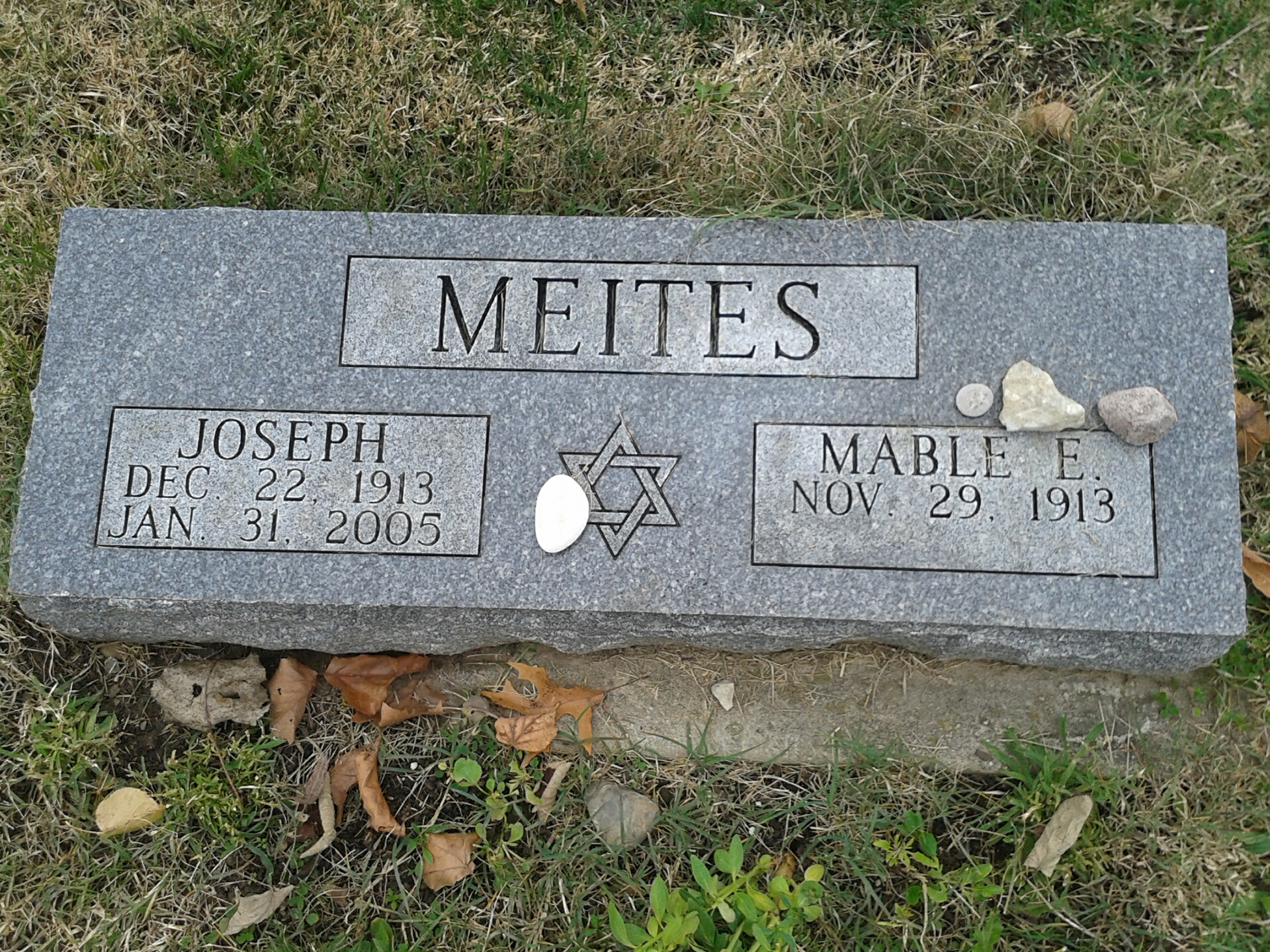Joseph Meites, born December 22, 1913, in Kishinev, Russia (now Moldavia), died on Monday, January 31, 2005, at the Hospice House of Mid-Michigan, at the age of 91.
He was preceded in death by his parents, Ben and Freda Meites, three brothers, Isidor, Morris and Samuel. Professor Meites is survived by his beloved wife, Mable, of 62 years; his brother, Jerry Meites of Farmington Hills, MI; a sister, Renee Meites-Lintz of Florida; and some nieces and nephews. Professor Meites emigrated to the United States (St. Joseph, MO) with his parents in 1920. He graduated from grade school, Central High School and Junior College in St. Joseph and received the BS, MA and Ph.D. degrees from the University of MO. He met his future wife, Mable, while at the University. They were married in 1943. From 1942-46,
he served in World War II as a First Lieutenant and was assigned to the 106th General Hospital in Southern England. In 1947, he was appointed as Assistant Professor of
Physiology at Michigan State University. In 1955, Professor Meites received a Weizmann Fellowship and he and his wife spent a year at the Weizmann Institute of Science in Rehovot, Israel, where he did research in endocrinology. Professor Meites was a mentor of over 80 graduate students who attained the Masters, Ph.D., and Post Doctoral degrees. His students have contributed to furthering medical knowledge worldwide. Together with his students, he edited six scientific books, wrote 85 chapters in other scientific books and more than 500 scientific articles, all in the area of endocrinology.
He was a pioneer in the field of neuroendocrinology and a co-founder and first President of the International Society of Neuroendocrinology. He served on many U.S. government scientific advisory committees,
on scientific journal editorial boards and university committees. He participated in many scientific conferences worldwide. Professor Meites received recognition for his contributions to teaching and scientific research including the MSU Distinguished Faculty Award, the Junior and Senior Sigma Xi awards, the Carl Hartman award in the study of reproductive physiology, the Robert H. Williams Distinguished Leadership award and other citations for his work on prolactin, hormonal control of breast cancer and his pioneering research on aging. Dr. Meites is known by students and colleagues as a pioneer in the field of endocrinology and as the scientist whose research established the foundation for the role of the brain in controlling hormone secretions that led to the winning of the Nobel Prize in Physiology by his colleagues Roger Guillemin, Andrew Schalley and Rosalyn Yallow in 1977. Dr. Meites was considered by his students and colleagues as a model of excellence in research education and ethical standards. They write that "He did everything in his power to help his students develop into bright scientists. He stimulated them and inspired them to do their utmost and allowed them complete freedom to sharpen their ideas and knowledge. He was never offended by their challenges to his ideas and criticisms of his theories. The affection and care he bestowed upon his students is a phenomenon not commonly seen during modern times. When seeing him at scientific meetings surrounded by his students and other young scientists one was reminded of the Greek teachers we read about in the classics." He was a member of the American Physiological Society, the Endocrine Society,
the Neuroendocrine Society, and a number of other scientific organizations. He retired as Professor Emeritus in 1984. He was a member of Congregation Shaarey Zedek.
Joseph Meites, born December 22, 1913, in Kishinev, Russia (now Moldavia), died on Monday, January 31, 2005, at the Hospice House of Mid-Michigan, at the age of 91.
He was preceded in death by his parents, Ben and Freda Meites, three brothers, Isidor, Morris and Samuel. Professor Meites is survived by his beloved wife, Mable, of 62 years; his brother, Jerry Meites of Farmington Hills, MI; a sister, Renee Meites-Lintz of Florida; and some nieces and nephews. Professor Meites emigrated to the United States (St. Joseph, MO) with his parents in 1920. He graduated from grade school, Central High School and Junior College in St. Joseph and received the BS, MA and Ph.D. degrees from the University of MO. He met his future wife, Mable, while at the University. They were married in 1943. From 1942-46,
he served in World War II as a First Lieutenant and was assigned to the 106th General Hospital in Southern England. In 1947, he was appointed as Assistant Professor of
Physiology at Michigan State University. In 1955, Professor Meites received a Weizmann Fellowship and he and his wife spent a year at the Weizmann Institute of Science in Rehovot, Israel, where he did research in endocrinology. Professor Meites was a mentor of over 80 graduate students who attained the Masters, Ph.D., and Post Doctoral degrees. His students have contributed to furthering medical knowledge worldwide. Together with his students, he edited six scientific books, wrote 85 chapters in other scientific books and more than 500 scientific articles, all in the area of endocrinology.
He was a pioneer in the field of neuroendocrinology and a co-founder and first President of the International Society of Neuroendocrinology. He served on many U.S. government scientific advisory committees,
on scientific journal editorial boards and university committees. He participated in many scientific conferences worldwide. Professor Meites received recognition for his contributions to teaching and scientific research including the MSU Distinguished Faculty Award, the Junior and Senior Sigma Xi awards, the Carl Hartman award in the study of reproductive physiology, the Robert H. Williams Distinguished Leadership award and other citations for his work on prolactin, hormonal control of breast cancer and his pioneering research on aging. Dr. Meites is known by students and colleagues as a pioneer in the field of endocrinology and as the scientist whose research established the foundation for the role of the brain in controlling hormone secretions that led to the winning of the Nobel Prize in Physiology by his colleagues Roger Guillemin, Andrew Schalley and Rosalyn Yallow in 1977. Dr. Meites was considered by his students and colleagues as a model of excellence in research education and ethical standards. They write that "He did everything in his power to help his students develop into bright scientists. He stimulated them and inspired them to do their utmost and allowed them complete freedom to sharpen their ideas and knowledge. He was never offended by their challenges to his ideas and criticisms of his theories. The affection and care he bestowed upon his students is a phenomenon not commonly seen during modern times. When seeing him at scientific meetings surrounded by his students and other young scientists one was reminded of the Greek teachers we read about in the classics." He was a member of the American Physiological Society, the Endocrine Society,
the Neuroendocrine Society, and a number of other scientific organizations. He retired as Professor Emeritus in 1984. He was a member of Congregation Shaarey Zedek.
Family Members
Sponsored by Ancestry
Advertisement
Records on Ancestry
Advertisement











